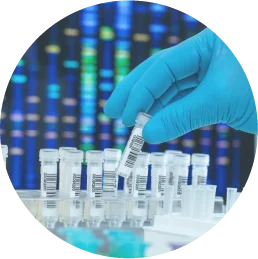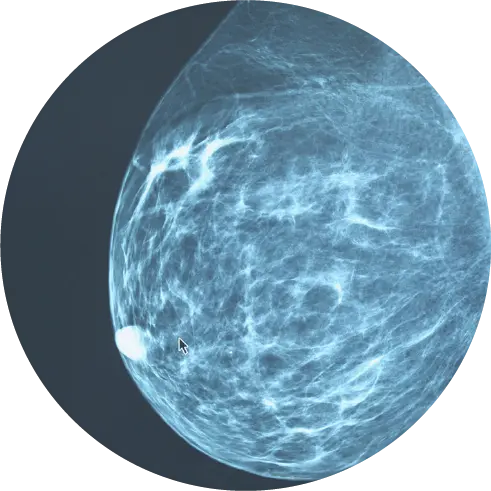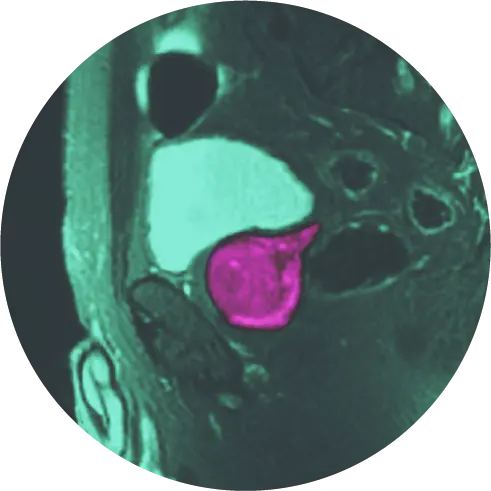Whether it’s the shape of your nose or the color of your eyes, you may have inherited some distinguishing physical traits from your parents or grandparents. However, you might also share some of their health risks.
If you have close family members who have had breast cancer, you may have an increased risk of developing the disease. However, knowing about your family health history is an important step toward lowering your risk.
Is Breast Cancer Hereditary?
Two of the most significant risk factors for breast cancer are beyond your control—your gender and your age. Research shows that breast cancer is most frequently diagnosed in women over the age of 50.
When younger women are diagnosed with breast cancer, they typically have a family history of the disease. According to the CDC, only about 5% to 10% of breast cancer cases are hereditary.1
Hereditary breast cancer results from gene mutations that you inherit from either parent. The most common inherited gene mutation is in the BRCA1 or BRCA2 gene.
In normal cells, these two genes manufacture proteins that help fix damaged DNA. However, mutated versions of these genes can cause abnormal cell growth that can lead to breast cancer in both women and men.
Having a first-degree relative (mother, sister, or daughter) or multiple family members diagnosed with breast, ovarian, or pancreatic cancer heightens your risk. Women with BRCA1 or BRCA2 gene mutations also have a higher chance of developing ovarian cancer and some other forms of the disease.2
Anyone can have the BRCA gene mutation. However, in the U.S., these gene changes are more common in Jewish people of Ashkenazi (Eastern Europe) descent. The CDC estimates that 1 in 40 Ashkenazi Jewish women has this BRCA gene mutation.3
How Can You Determine Your Risk?
Knowing about your family health history is critical for understanding your breast cancer risk. If your family history includes breast cancer—or if you don’t know for sure—you should talk with your healthcare professional. Your doctor may recommend you start getting screened for breast cancer, and they may refer you for genetic counseling.
Genetic counseling can involve testing to determine if you carry the a gene mutation that may increase your risk of developing breast cancer. You and the genetic counselor can also build a family tree to find any patterns in your family medical history. The counselor may use a computerized tool to help predict the likelihood of you having a cancer-related gene mutation.
You’ll also discuss the timing of any tests and screenings and what steps you’ll need to prepare for after obtaining your genetic test results. Keep in mind that learning you are at increased risk for hereditary cancer is understandably stressful, and genetic testing is not for everybody.4
Other Gene Mutations That May Put You at Risk
Although the BRCA gene mutations are more common, there are other inherited gene changes that can put you at risk for breast cancer. They include the following:
- ATM gene
- PALB2 gene
- TP53 gene
- CHEK2 gene
- PTEN gene
- CDH1 gene
- STK11 gene
All of the previously mentioned genes are a part of HALO Precision Diagnostics™’ hereditary cancer gene panel. To learn more about genetic testing for gene mutations that can put you at an increased risk of developing breast cancer, please visit this page.
Understanding Your Breast Cancer Risk
Having a family history of breast cancer does not mean you will get cancer and many people with a family history don’t develop cancer in their lifetime.
What is important to know is that having a first-degree relative with breast cancer nearly doubles your risk, and having two first-degree relatives can almost triple your risk.5
However, you can make lifestyle changes that can help lower your risk of developing breast cancer. These include:
- Eating nutritious food
- Maintaining a healthy weight
- Exercising regularly
- Limiting alcohol
- Not smoking
- Breastfeeding your children
- Limiting hormonal therapy6
The Importance of Regular Screening
Ask your doctor about how breast cancer screenings can help. Today’s state-of-the-art imaging equipment can find signs of cancer months or even years before symptoms are noticeable. When tumors or other signs of cancer are discovered early treatment options are easier and more successful.
At HALO, our mission is saving lives with precision diagnostics. We know that early detection allows for less-invasive, more-precise treatment sooner, and a longer, better quality of life.
Contact us to schedule breast screenings at our HALO Breast Care Center in Chico, Silicon Valley MRI in Silicon Valley, Palms Imaging Center in Oxnard, and Precision Imaging Centers’ four locations in and around Jacksonville, Florida.
References
- https://blogs.cdc.gov/cancer/2022/10/14/when-it-comes-to-breast-cancer-sometimes-its-all-in-the-family/
- https://www.cancer.org/cancer/breast-cancer/risk-and-prevention/breast-cancer-risk-factors-you-cannot-change.html
- https://www.cdc.gov/cancer/breast/young_women/bringyourbrave/hereditary_breast_cancer/jewish_women_brca.htm#:~:text=One%20in%2040%20Ashkenazi%20Jewish,cancer%20at%20a%20young%20age.
- https://www.breastcancer.org/genetic-testing/what-to-expect
- https://www.breastcancer.org/risk/risk-factors/family-history
- https://www.mayoclinic.org/healthy-lifestyle/womens-health/in-depth/breast-cancer-prevention/art-20044676




